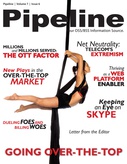|
|

By
Ed Finegold
To date, the debate over net neutrality has been one of extremes. The more I
read about it, the more puzzled I am by the myriad points of view that swirl
around it. There are those who believe insidious forces within the Federal
Government want to see net neutrality erased so that they can put a stop to the
free flow of information the Internet enables. Others believe that any easing of
net neutrality will result in corporations owning the Internet, and the end of
its egalitarian state. Some oppose net neutrality because it represents
government interference that enables a market where over-the-top business models
get a free ride on the back of companies that spend billions to maintain the
Internet’s infrastructure. I’d like to believe there’s a happy medium, even if I
have little confidence that regulators will succeed in defining or delivering
it.
The Problem in a Nutshell
In my opinion, which I realize many
people will disagree with, the problem
with net neutrality is that it does, in
fact, provide free rides to service
providers who don’t contribute their
fair share to the maintenance of the
|
|
The public Internet, as we know it, has a life of its own now. |
|


 The Case for Premium
The Case for Premium
The public Internet, as we know it, has a life of its own now. The idea of it
being stifled by regulation is ironic, given that it’s such a potent enabler of
so many black market business models like software piracy, illegal music sharing
and the infamous Nigerian banking scams. The bottom line is that the public
Internet isn’t going anywhere, but people would benefit from an option that
provides higher quality, more security and content choices that are cleansed
before being presented.
|
|
|
|
|

infrastructure that enables their
businesses. Of course, we all know the
upside to this is that as a result the
Internet’s economics have spawned
opportunities for millions of businesses
that employ people, drive innovation
and arguably change the world. For
that reason, it makes sense to protect
the Internet from being laden with
onerous toll booths that could stifle its
economic fertility.
Things go off the rails, however, when discussions about premium services enter
the picture. Because the approach to net neutrality has been extreme thus far,
the concept of premium, Internet-like services has been met with resistance. The
argument typically backs into the idea that big corporations will take over and
snuff all the things we love about the open, egalitarian Internet. If we allow
network operators to charge a premium for higher quality services, somehow that
means we won’t be able to access YouTube, post anonymous comments on blogs, or
download freeware that gives us viruses anymore.
|
|

As a relatively new parent, I’ve become much more sensitive to the Internet’s
openness. Along with the good comes an awful lot of bad – inappropriate images,
foul language and every scam imaginable. There are also issues like low quality
video, choppy streaming and slow downloads. From that perspective, what’s wrong
with allowing service providers to deliver a “premium Internet” for which you
pay a bit extra to have these problems solved or eliminated for you?
I’d like something like Hulu that didn’t
limit how many episodes of a given
show are online at a given time. I’d like
to let my daughter search the Internet
for educational videos about gorillas,
without the most inappropriate content
imaginable appearing on screen (yes,
this has really happened). I’d like to be
able to filter out anything that includes
the “F word”, anything remotely related
to pop stars that resemble strippers
and imagery that promotes violent
video games or bombards my kid with
advertisements for toys (of which she
has more than enough, I assure you).
Right now, net neutrality is basically
preventing this from emerging because
|
|
|



 The Case for Premium
The Case for Premium


